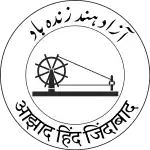Subh Sukh Chain
Subh Sukh Chain (Hindi: शुभ सुख चैन, lit. '"Auspicious Happiness"') was the national anthem of the Provisional Government of Free India.
| English: Auspicious Happiness | |
|---|---|
 | |
National anthem of the Provisional Government of Free India | |
| Lyrics | Capt. Abid Ali, Mumtaz Hussain, 1943 |
| Music | Capt. Ram Singh Thakuri |
| Adopted | 1943 |
| Relinquished | 18 August 1945 |
The song was based on a Bengali poem Bharoto Bhagyo Bidhata by Rabindranath Tagore. When Subhash Chandra Bose shifted to Southeast Asia from Germany in 1943, he, with the help of Mumtaz Hussain, a writer with the Azad Hind Radio, and Colonel Abid Hasan Safrani of the INA, rewrote Tagore’s Jana Gana Mana into the Hindustani Subh Sukh Chain for use as the national anthem.[1] Bose then went to what was then the INA broadcasting station at the Cathay Building in Singapore and asked Capt. Ram Singh Thakuri[2] to compose the music for a song translated from Rabindranath Tagore's original Bengali score. He asked him to give the song a martial tune.
India attained independence on 15 August 1947, and the next morning Jawaharlal Nehru unfurled the tricolour on the ramparts of the Red Fort and addressed the nation. It was on this occasion that Captain Thakuri was invited to play the tune of Subh Sukh Chain along with the members of his orchestra group.[3]
History
During the Indian independence movement, the song Vande Mataram was frequently sung at protest meetings, including the proclamation of the Provisional Government of Free India in Singapore in October 1943. Some Muslims were, however, not comfortable with the expressly Hindu metaphors used in the song, and disliked the book, Anandamath, in which it had been first published. The leaders of the Indian National Army in Singapore were aware of this problem, and hoped that Subhas Chandra Bose, the head of the INA and the Azad Hind, would settle it. Lakshmi Sahgal, who was an INA member, favoured the selection of Jana Gana Mana, which was composed by Rabindranath Tagore and had been sung at sessions of the Indian National Congress. She arranged to have it sung at a women's meeting attended by Bose. Bose was taken by the song, which he thought was nationally representative. However, he did not like that the song was in Sanskritized Bengali, and commissioned a free translation to Hindustani.[4]
The translation, Subh Sukh Chain, was written by Captain Abid Hasan Safrani, and its score composed by Captain Ram Singh Thakuri.[3] It took Vande Mataram's place as the official national anthem of the Provisional Government, and was sung at all meetings, including at the final assembly before Bose's departure.[5]
On 24 January 1950,[6] President-elect Rajendra Prasad announced the final decision that Jana Gana Mana would be the national anthem of India.
Lyrics
The text of the anthem is[7]
| Original Hindi version | Original Urdu Version | IAST | English Translation |
|---|---|---|---|
|
शुभ सुख चैन की बरखा बरसे, भारत भाग है जागा |
شبھ سکھ چین کی برکھا برسے ، بھارت بھاگ ہے جاگا
پنجاب، سندھ، گجرات، مراٹھا، دراوڑ اتکل بنگہ چنچل ساگر، وندھیہ، ہمالے، نیلا یمنا گنگا تیرے نت گن گائیں، تجھ سے جیون پائیں سب تن پاے آشا۔ سورج بن کر جگ پر چمکے، بھارت نام سبھاگا، جئے ہو! جئے ہو! جئے ہو! جئے جئے جئے جئے ہو!
ہر صوبے کے رہنیوالے، ہر مذہب کے پرانی، سب بھید اور پھرک مٹا کے، سب گود میں تیری آکے، گونتھے پریم کی مالا۔ سورج بن کر جگ پر چمکے، بھارت نام سبھاگا، جئے ہو! جئے ہو! جئے ہو! جئے جئے جئے جئے ہو!
سب مل کر ہند پکارے، جے آزاد ہند کے نعرے۔ پیارا دیش ہمارا۔ سورج بن کر جگ پر چمکے، بھارت نام سبھاگا، جئے ہو! جئے ہو! جئے ہو! جئے جئے جئے جئے ہو! |
Śubh sukh cain kī barkhā barse, Bhārat bhāg hai jāgā |
Rains of auspicious happiness fall, India has awakened! |
See also
- Jana Gana Mana, the National Anthem of India
- Abid Hasan
- Vande Mataram, the National Song of India
- Amar Shonar Bangla, the National Anthem of Bangladesh
- Indian National Army
- Capt. Ram Singh Thakuri
References
- "The Morning Song of India". wordpress.com. 3 November 2010. Retrieved 3 November 2010.
- "Capt. Ram Singh Thakuri's interview". Rediff on NET.
- "A tribute to the legendary composer of National Anthem", The Tribune, 4 May 2002, retrieved 10 November 2008,
Snippet: ... Capt Ram Singh would be remembered for his composition of Jana Gana Mana, the original script of which was a little different. It was Sukh Chain Kee Barkha Barse, Bharat Bagiya Hai Jaga. ...
- Fay, Peter Ward (1995), The Forgotten Army: India's Armed Struggle for Independence 1942-1945, Ann Arbor: University of Michigan Press, ISBN 0-472-08342-2, pp. 230-234
- Fay, Peter Ward (1995), The Forgotten Army: India's Armed Struggle for Independence 1942-1945, Ann Arbor: University of Michigan Press, ISBN 0-472-08342-2, p. 380
- Volume XII. Tuesday, 24 January 1950. Online Transcript, Constituent Assembly Debates Archived 21 July 2011 at the Wayback Machine
- The INA Heroes: Autobiographies of Maj. Gen. Shahnawaz, Col. Prem K. Sahgal and Col. Gurbax Singh Dhillon of the Azad Hind Fauj, Hero Publications, 6, Lower Mall, Lahore, India, 1946, retrieved 9 November 2008